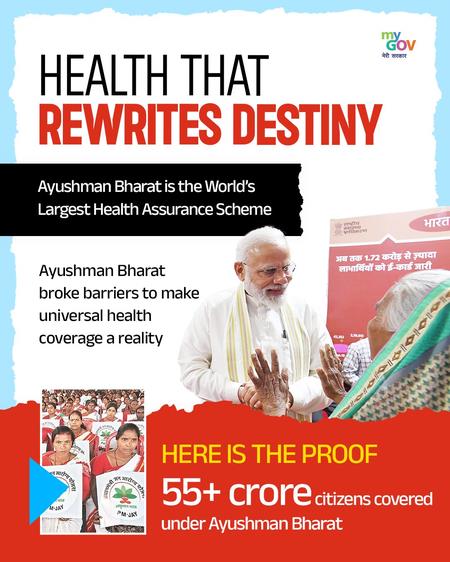Ayushman Bharat, POSHAN Abhiyaan Reducing Disease, Building Human Capital: PM Modi
In a post on social media platform X, the Prime Minister's Office (PMO) shared a media article by Dr. Devi Prasad Shetty, Chairman at Narayana Health, which discussed how the government has made healthcare an instrument for economic transformation.
“Dr. Devi Prasad Shetty writes that India's healthcare is now a key driver of economic growth. Initiatives like Ayushman Bharat, POSHAN Abhiyaan, and Swachh Bharat are reducing disease, protecting household savings, and building human capital,” the post said.
“Seeing health as an investment, not a cost, is boosting governance and prosperity,” it added.
In the article, Shetty, a noted cardiologist, detailed how healthcare policy under Prime Minister Narendra Modi has moved from welfare to building a“Viksit Bharat” -- a developed India -- by 2047.
Sharing the achievements under the government-led health initiatives, he said these demonstrate that“good governance in healthcare is also sound economic policy”.
Shetty elucidated how Ayushman Bharat, launched in 2018, has become the world's largest publicly funded health insurance scheme. The scheme covers more than 55 crore economically vulnerable citizens -- providing accessible and affordable healthcare to the common man.
The health insurance scheme has been key in reducing Out-of-Pocket Expenditure (OOPE) through increased social security and primary health spending.
Till June, more than 9.84 crore hospital admissions worth over Rs. 1.40 lakh crore have been authorised under the flagship AB PM-JAY scheme, as per Health Ministry data.
Even as malnutrition among pregnant women, lactating mothers, and young children has been a major concern, the government launched POSHAN Abhiyaan in 2018.
Shetty noted that the initiative, which focuses on providing better nutrition in early life, will be“a return on investment measurable in decades of higher productivity”.
Further, with the sanitation drive under Swachh Bharat Mission, tens of millions of toilets built across villages and towns drastically reduced open defecation, cutting water-borne disease and saving an estimated 60,000-70,000 infant lives every year, Shetty said.
“The transformation in India's health sector since 2014 shows how a government can harness public policy to achieve both equity and economic dynamism. By recasting healthcare as a pillar of productivity, Modi has shifted the narrative from charity to investment,” Shetty said, in the article.

Legal Disclaimer:
MENAFN provides the
information “as is” without warranty of any kind. We do not accept
any responsibility or liability for the accuracy, content, images,
videos, licenses, completeness, legality, or reliability of the information
contained in this article. If you have any complaints or copyright
issues related to this article, kindly contact the provider above.
Most popular stories
Market Research

- Kucoin Presents Kumining: Embodying Simple Mining, Smart Gains For Effortless Crypto Accumulation
- 1Inch Becomes First Swap Provider Relaunched On OKX Wallet
- Cregis Joins TOKEN2049 Singapore 2025
- Leverage Shares Launches First 3X Single-Stock Etps On HOOD, HIMS, UNH And Others
- Blockchainfx Raises $7.24M In Presale As First Multi-Asset Super App Connecting Crypto, Stocks, And Forex Goes Live In Beta
- BILLY 'The Mascot Of BASE' Is Now Trading Live On BASE Chain






















Comments
No comment